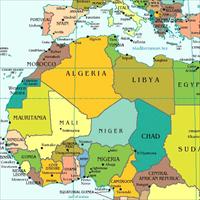Central Banks of West African States / Banque Centrale des Etats de l’Afrique de l’Ouest: Missions and objectives

Issue of currency
The Central Bank has the sole right of currency issue throughout West African Member States member States.
It issues the monetary signs, banknotes and coins which are legal tender and the territory of the members States of the Union. The creation, issue and cancellation of monetary signs are decided by the Council of Ministers.
Despite the development of srciptural payment media, banknotes and coins continue to be widely used by economic agents transactions. The exchange of banknotes between the member States of the Union is favoured by the single monetary signs.
As far as printing is concerned, the Central Bank is permanently seeking to improve the authentication of its monetary signs with a view to enhancing the security of the banknotes it issues. The decisions respectively taken in 1977 and 1991 for the renewal and completion of the banknotes and coins in circulation fall within that scope.
Monetary policy
The Central Bank of West African States is also responsible for the management of the monetary policy of the WAMU member States. This monetary policy is aimed at:
• adjusting global liquidity in the economy according to the evolution of the economic situation, so as to ensure price stability, and
• promoting economic growth
Organisation and supervision of banking activity
The Central Bank defines the regulations applicable to banks and financial institutions and ensures the supervision of their activities. In that respect, the Banking Commission, created on April 4, 1990 and chaired by the Governor of the BCEAO, is responsible for the organisation and supervision of the WAMU banking sector. BCEAO assumes the Secretariat General of the Banking Commission.
Assistance to WAMU member States
The Central Bank provides assistance to the Governments of the States of the Union at their request in relation with international financial and monetary institutions and its negotiations concerning the conclusion of international financial agreements. It may be charged with the execution of such agreements on conditions determined by conventions approved by the Board of Directors. As regards in particular the relations of the Member States with the International Monetary Fund, the Central Bank acts as a fiscal agent in accordance with the provisions of the Agreement of September 24, 1981, signed between BCEAO and the member States.
The Central Bank the States of the Union in the definition and follow-up of their adjustment programs and also in the management. In particular, it assists Government in their negotiations of their external debt rescheduling. The Central Bank may also lend its assistance in the definition, harmonisation and application of the regulations governing external financial relations. In that respect, it notably
establishes the balance of payments of the States.
Other activities
The Central Bank takes an active part in the discussion with the partners of the Franc Zone concerning the reform of the insurance, social security provisions, savings mobilisation, business law, the Franc Zone Monitoring Office for economic trends (Observatoire économique de la zone franc) and regional training centres.
The Central Bank has developed a training policy for its staff members which it has subsequently extended to banks and financial institutions, economic and financial administrations of member States and of some sub-regional countries. This training is provided by the West African Centre for Banking Studies and Training (COFEB), which is located at the Head Office of BCEAO. The creation of this centre was motivated by the necessity to harmonise the training of the banking sector senior executives and to give to it a more regional scope. Since its inception in August 1977, the COFEB has trained 988 executives representing 0 sessions divided as follows : 380 trainees for National Administrations, 214 trainees for Banks and Financial Institutions and 394 trainees for BCEAO. The COFEB succeeds the Training Centre of Abidjan which formerly ensured the training of BCEAO senior executives.
In another connection, the Conference of Heads of State of the West African Economic Community (CEAO) which met in Ouagadougou, Burkina Faso, on March 15, 1994 decided to dissolve CEAO and all its specialised institutions. On that occasion, the BCEAO desirous to rationalise and optimise the training potential in the sub-region and wishing to safeguard the achievements of the African Centre for Higher Studies in Management (CESAG) which started its activities in 1985 in Dakar, took the fixed assets of this training centre. The two protocols defining the terms and modalities for the transfer of CESAG to BCEAO were signed on September 6, 1995 at the meeting of the Council of Ministers of BCEAO, and on November 16, 1995, with the Republic of Senegal
http://www.bceao.int
Central Banks of West African States / Banque Centrale des Etats de l’Afrique de l’Ouest
 Back and Next - Back and Next
Back and Next - Back and Next See Also - See Also
See Also - See Also